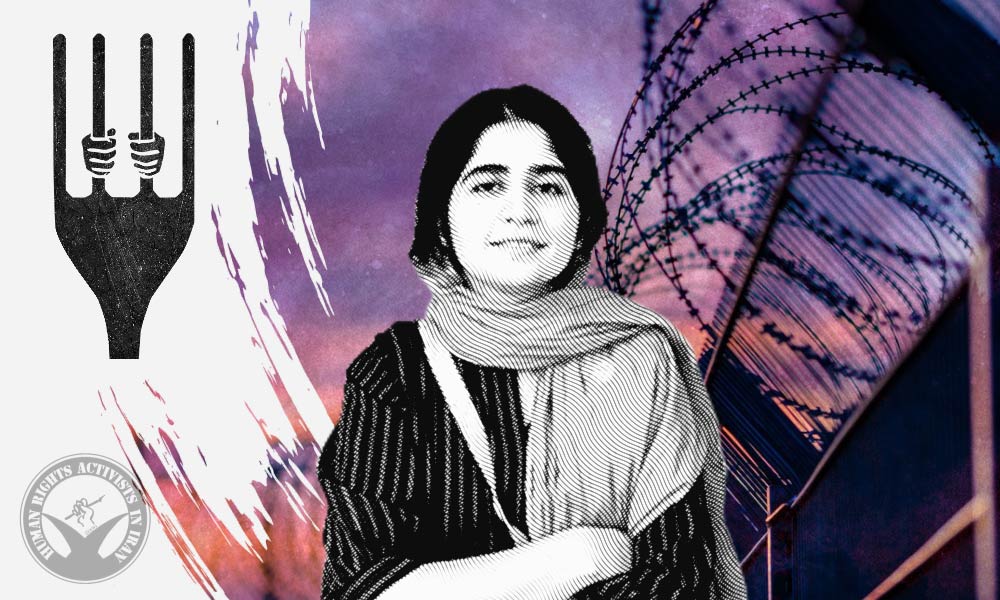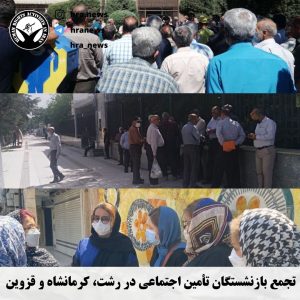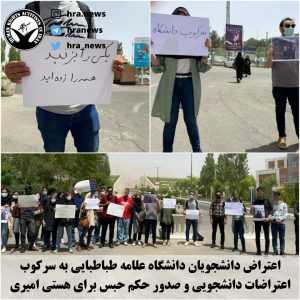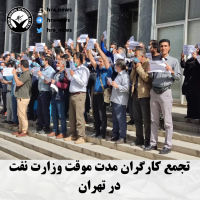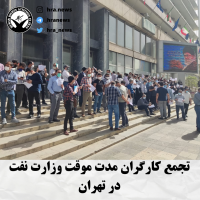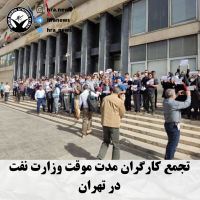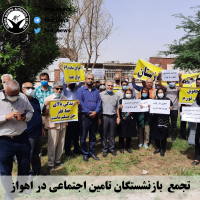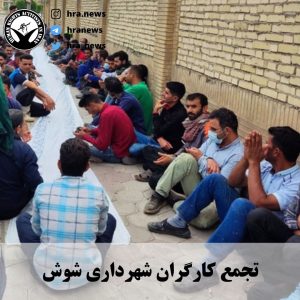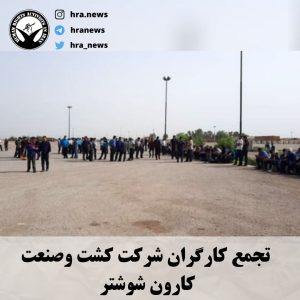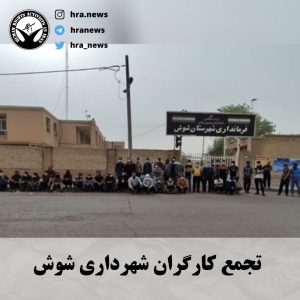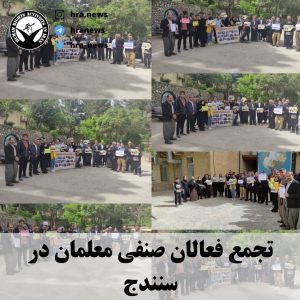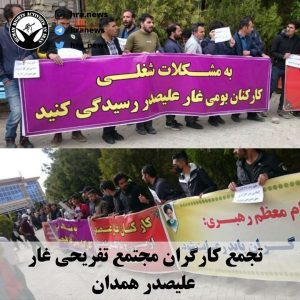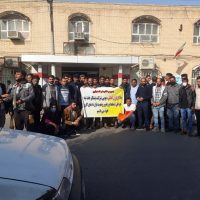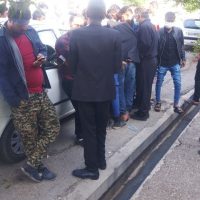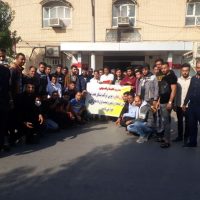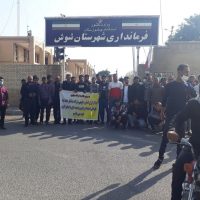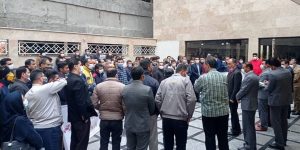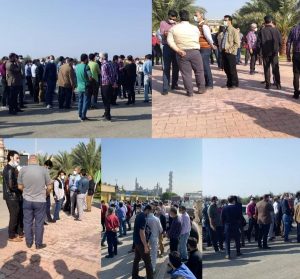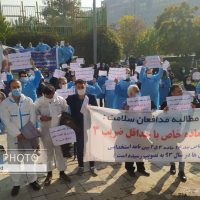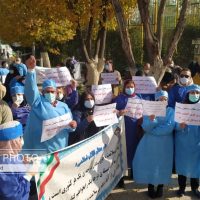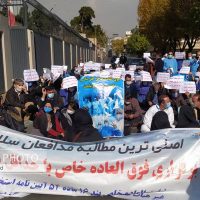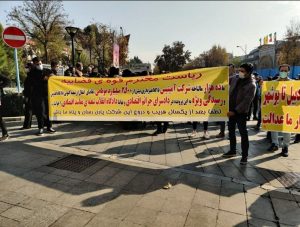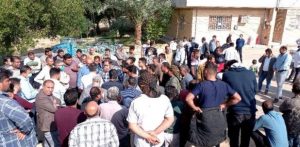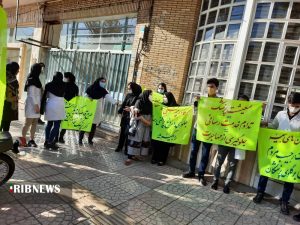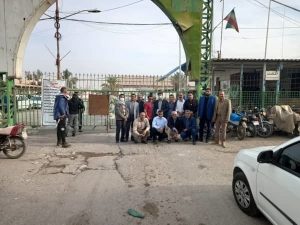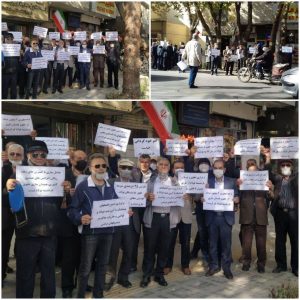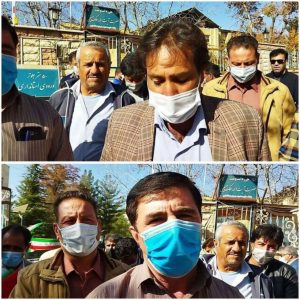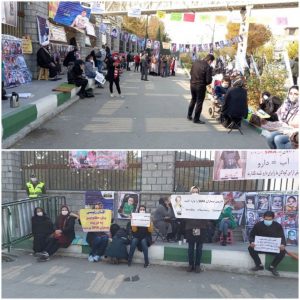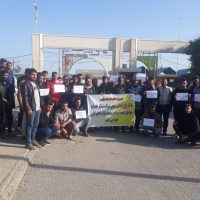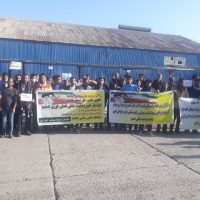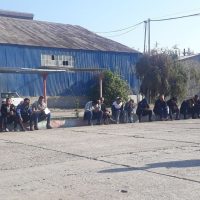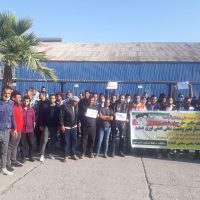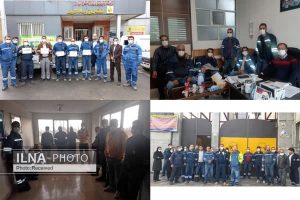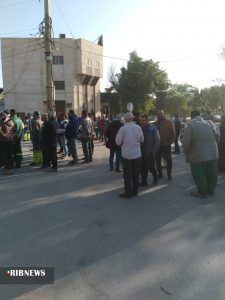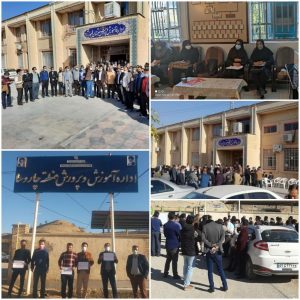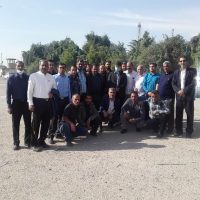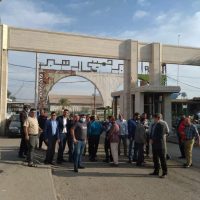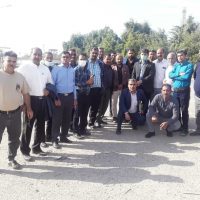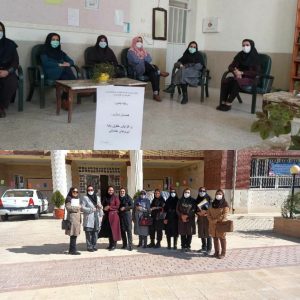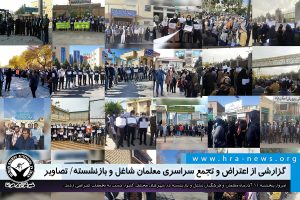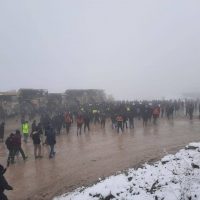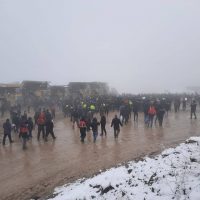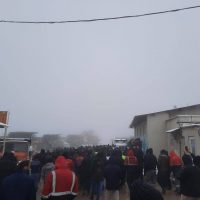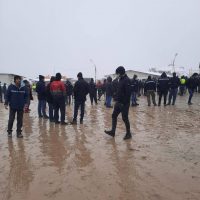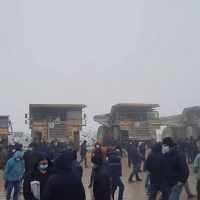HRANA News Agency – Published on the occasion of International Workers’ Day, this report aims to highlight the challenges Iranian workers face, including lack of legal protection, labor rights violations, low wages, unpaid salaries, and unsafe working conditions.
According to HRA’s Department of Statistics and Publications, an analysis of labor-related reports from May 1, 2024, to April 27, 2025, reveals that at least 18,354 workers were reported killed or injured in workplace incidents, as documented by media outlets and organizations active in labor rights.
At least 16,273 workers were injured in workplace accidents over the past year. In one official nationwide and provincial report, authorities reported 16,000 injured, in addition to 273 other reports collected and disseminated by civil or labor organizations.
At least 2,081 workers also lost their lives in workplace accidents during this period. Authorities and relevant organizations reported in an official report the death of 2,000 workers, while independent bodies documented an additional 81 worker deaths not mentioned by officials.
Workers experienced a tragic year during the reporting period. Notably, on the evening of September 21, 2024, a massive explosion occurred at the Madanjo coal mine in Tabas, South Khorasan Province—one of the deadliest mining accidents in Iran’s history. The incident was caused by a sudden release of methane gas in Block C of the mine, which triggered an explosion and the spread of toxic gases into Block B. At the time, 69 workers were present in the two blocks. The blast claimed the lives of 52 workers and injured more than 20 others. Official reports cited inadequate ventilation, the absence of accurate gas sensors, and poor safety oversight as the main causes of the disaster.
The latest in a series of tragic incidents was the explosion at Shahid Rajaee Port in Bandar Abbas. Labor activists reported the death of 46 workers, including three female workers at the time of this writing. Moreover, more than 1,242 injuries were reported by official media, though it remains unclear how many of them were workers. Nevertheless, the head of the Bandar Abbas Workers’ Retirees Association emphasized that most of the victims were workers. This human tragedy, occurring on the eve of the International Day for Safety and Health at Work, highlights that neglecting workplace safety not only endangers thousands of workers’ lives but also inflicts irreparable human and economic damages on society. This reality underscores the importance of more serious enforcement of laws and continuous oversight of compliance with safety principles in work environments.
Despite the significant figures cited above, it is important to note that the majority of workplace incidents go unreported in the media due to the lack of transparency from responsible institutions and officials. Most Iranian workers face unsafe working conditions, with little job security and insufficient insurance coverage. A shortage of labor inspectors and weak safety infrastructure continue to hinder both the documentation and prevention of workplace accidents.
According to the reports compiled by the statistics department of this organization, the distribution of workplace incidents is as follows: 22.63% due to falls from height, 14.23% due to traffic accidents, 10.57% due to fires, 10.37% due to being struck by a hard object, 8.85% due to poisoning, 7.62% due to mining accidents, 6.42% due to gas inhalation, 6.39% due to factory incidents, 6.19% due to electrocution, 2.46% due to construction accidents, 2.30% due to well accidents, 0.81% due to explosions, 0.49% related to petrochemical and refinery incidents, 0.23% unknown causes, 0.19% due to smoke inhalation, 0.13% due to agricultural incidents, and 0.13% due to drowning.
Additionally, based on the statistics gathered by the Statistics Center of Human Rights Activists, at least 1,233 months of wage arrears have been recorded across 92 industrial and service units.
According to the reports compiled by this organization’s statistics department, 72.19% of wage arrears are related to governmental organizations, 14.64% to private organizations, 8.80% are unknown, and 4.36% pertain to the energy industry.
It should be noted that a large portion of the published reports on wage arrears did not specify the number of workers involved, which is a major factor preventing accurate statistics on the number of workers claiming unpaid wages.
While estimates suggest a high level of protests within the labor community, over the past year, a total of only 738 labor protests and 1,145 union protests were reported by media or civil organizations. union protests decreased by 20%, while labor protests increased by 72%.
Among the most significant events in Iran over the past year are the protests by workers at Haft Tappeh Sugarcane Company, farmers, miners at the Western Yurt Winter Mine, workers at South Pars Gas Complex, as well as union protests by teachers, retirees, and Social Security pensioners.
Over the past 12 months, various cities across Iran witnessed different forms of protest movements by workers. A wide range of workers took to the streets due to non-payment of monthly wages and neglect of their insurance demands. Some workers protested after not receiving up to 30 months of wages. Consequently, 1,373 labor strikes and 69 union strikes took place. Labor strikes increased by 1,315% and union strikes by 86%.
Over the past year, the scale of organized demands by various sectors of the working class has been unprecedented. However, repression, deliberate disruption, non-recognition of independent labor unions and associations, the imprisonment and sentencing of several labor activists, and systematic obstruction of the right to protest have contributed to the fragmentation and disorganization of some labor protests and gatherings.
Labor unions, in their conventional international sense, do not exist in Iran. Independent organizations such as the Syndicate of Workers of Tehran and Suburbs Bus Company, the Haft Tappeh Sugarcane Workers’ Syndicate, the Coordinating Council of Teachers’ Unions, and the Free Workers’ Union face accusations of security and political offenses.
Many workers have been arrested or convicted on charges such as organizing peaceful gatherings and protesting low wages.
Over the past 12 months, at least 13 workers and labor activists have been arrested. Notable among these arrests are at least three workers from Barez Tire Factory in Kerman and four workers from Asfalt Toos Company.
It is also worth mentioning that Ebrahim Madadi, Nahid Khodajoo, Anisha Asadollahi, Nasrin Javadi, Yadi Bahari, and Mehran Raouf are among the prominent labor activists currently imprisoned along with union activists such as Asghar Amirzadegan.
| |||
|
|
Furthermore, there have been sentences against 10 labor activists and workers totaling 340 months of discretionary imprisonment, 5 cases of self-immolation, 5 cases of suicide, interrogation of 7 individuals by security bodies, 5 cases of sentence execution, 1 home search, summoning of 14 individuals to judicial and security authorities, 11 factory closures, 4,424 cases of dismissal and layoffs, 585 cases of unemployment, 1,024,872 cases of workers lacking work insurance, and 5,105 cases of workers left in limbo regarding their employment status.
In the unions and guilds sector, there have been a total of 27 arrests of union activists, 804 months of discretionary imprisonment, 92 months of suspended imprisonment, 29 lashes, 577.4 million tomans in fines, 168 months of exile for 72 union activists, 3 travel bans, 18 court trials, 118 summonses to judicial-security authorities, 315 place closures, 11 cases of dismissals and layoffs, at least 165 months of wage arrears, 3 cases of forced retirement, 3 home searches, 5 sentence executions, and 5 cases of assault reported.
Over the past year, active and retired teachers and educators across various cities and provinces of the country staged protests and strikes to demand their unmet claims. Accordingly, 98 protests and 2 strikes have been recorded. It is noteworthy that in the past year, there have been 14 arrests, 56 summons, 16 court trials, at least 11 months of delayed salaries, 8 cases of dismissal and prohibition from teaching, and 3 cases of forced retirement among teachers. Additionally, 69 teachers and activists in this sector have been sentenced to a total of 780 months of discretionary imprisonment, 92 months of suspended imprisonment, 29 lashes, 3 cases of deprivation of social rights, and 537.4 million tomans in fines.
The Executive Secretary of the Khorasan Razavi Workers’ House identified the wide gap between wages and living costs as the most significant problem for workers and retirees, stating that despite wage adjustments based on inflation rates, the rapid rise in prices has further reduced the purchasing power of these groups. Seyed Hossein Rasouli added that, given the steep inflation in basic goods in recent months, the wages received by workers and retirees only cover about two weeks of their monthly expenses. He criticized the government, as the country’s largest employer, for not considering workers’ satisfaction and welfare in its calculations.
Meanwhile, Mohammad Chakoshian, Deputy Minister of Cooperatives, Labor, and Social Welfare, in response to the Chamber of Commerce’s announcement regarding a “10% wage reduction for workers with Friday closures,” claimed: “This cannot be implemented because it is illegal, and no one can reduce a worker’s salary against labor laws; if such a violation occurs, it must be stopped.”
According to a report by the National Research Center, occupational accidents are the second leading cause of death in the country, with miners suffering the most due to the lack of safety systems and weak oversight. The rising death toll due to officials’ neglect of workplace safety is a clear example of the violation of workers’ human rights.
Furthermore, the Executive Secretary of the Saveh Workers’ House pointed out the harsh living conditions for workers and retirees, attributing the main cause to behind-the-scenes collusion among parliament members, government officials, and their economic team, whose promises were imposed on workers’ representatives in the Supreme Labor Council.
Additionally, a member of the Parliament’s Commission for Internal Affairs and Councils highlighted the problems faced by workers at Esfandeh Copper Mines in Arzooieh County, stating: “These miners work hundreds of meters underground for a monthly income of 10 to 12 million tomans, which is unjust.” Yasser Soleimani further noted: “Workers at one of the copper mines in this region must travel three hours daily on dirt roads to reach their workplace and return.”
Moreover, the President of the Association of Trade Unions of East Azerbaijan Province stated that some employers, to evade the 4% insurance premium for hazardous jobs, dismiss workers before they reach 20 years of service to prevent them from qualifying for early retirement benefits. Others avoid past debts by changing the factory name and registering a new workshop code. Saeed Fattahi added that the issuance of Directive 1777 by the Social Security Organization has exacerbated problems for workers in hazardous jobs.
Additionally, the Vice President of the Supreme Council of Islamic Labor Councils announced that 70% of workers covered by labor law, despite the minimum wage increase this year, still face a livelihood deficit of around eight million tomans compared to the actual cost of living. Ali Khodaei attributed this situation to unrealistic wage-setting policies, government neglect of the industrial sector, migration of skilled labor, and workers turning to precarious jobs.
According to the recent resolution of the Supreme Labor Council, workers’ housing allowance has remained unchanged at 900,000 tomans for the second consecutive year. This is despite the latest data from Iran’s Statistical Center, which shows that annual housing sector inflation has reached 40.8%. The lack of an increase in this allowance comes at a time when the value of the dollar has risen by 60% since the beginning of the year and the general inflation rate has reached 32% by the end of February. This glaring gap between the meager wage increases and rampant inflation has turned housing costs into a serious crisis for workers.
It is worth mentioning that Ali-Asghar Nakhai Rad, a member of Parliament, stated that workers’ purchasing power has decreased by 40% compared to the past. In recent years, workers’ wages have lagged behind inflation, and now we are facing an accumulation of this gap. He emphasized that, considering the possibility of higher inflation next year, the wage increase for workers in 2025 must exceed the inflation rate announced by the Central Bank.
The ILNA news agency reported that the heavy debt of the Social Security Organization to medical centers and pharmacies has deprived insured individuals of healthcare services. Esmaeili, Acting Director of Social Security’s Healthcare Management in Markazi Province, stated that employers’ debts to Social Security amount to 1.14 quadrillion tomans, which is six times the amount Social Security owes to medical centers. Khosrow Ranjbar, a retirees’ rights activist, also criticized this situation, stressing that workers and retirees have been deprived of medical care due to managers’ irresponsibility and employers’ profiteering, even though insurance premiums have been deducted from their wages but not paid to Social Security.
Other demands of the labor community include the prohibition of child labor and the provision of free education for children, the establishment of the highest safety standards in work environments, and the elimination of discriminatory laws against women and migrant workers.
Despite Iranian women workers being described as the cheapest labor force in the country, their employment situation is worse than that of men, and they enjoy fewer legal protections, rights, and benefits. Moreover, women workers have less bargaining power compared to their male colleagues. Production and industrial units are less inclined to hire married women, and in some cases, single women are employed under the condition that they do not marry or become pregnant.
The situation of female workers in small workshops is even worse. Women make up half of the workers in brick kilns, where they work under extremely harsh conditions.
In Iran, Workers’ Day arrives amid continued privatization of factories and state-owned companies without considering the long-term interests of workers, a situation that has led to widespread labor protests.


















